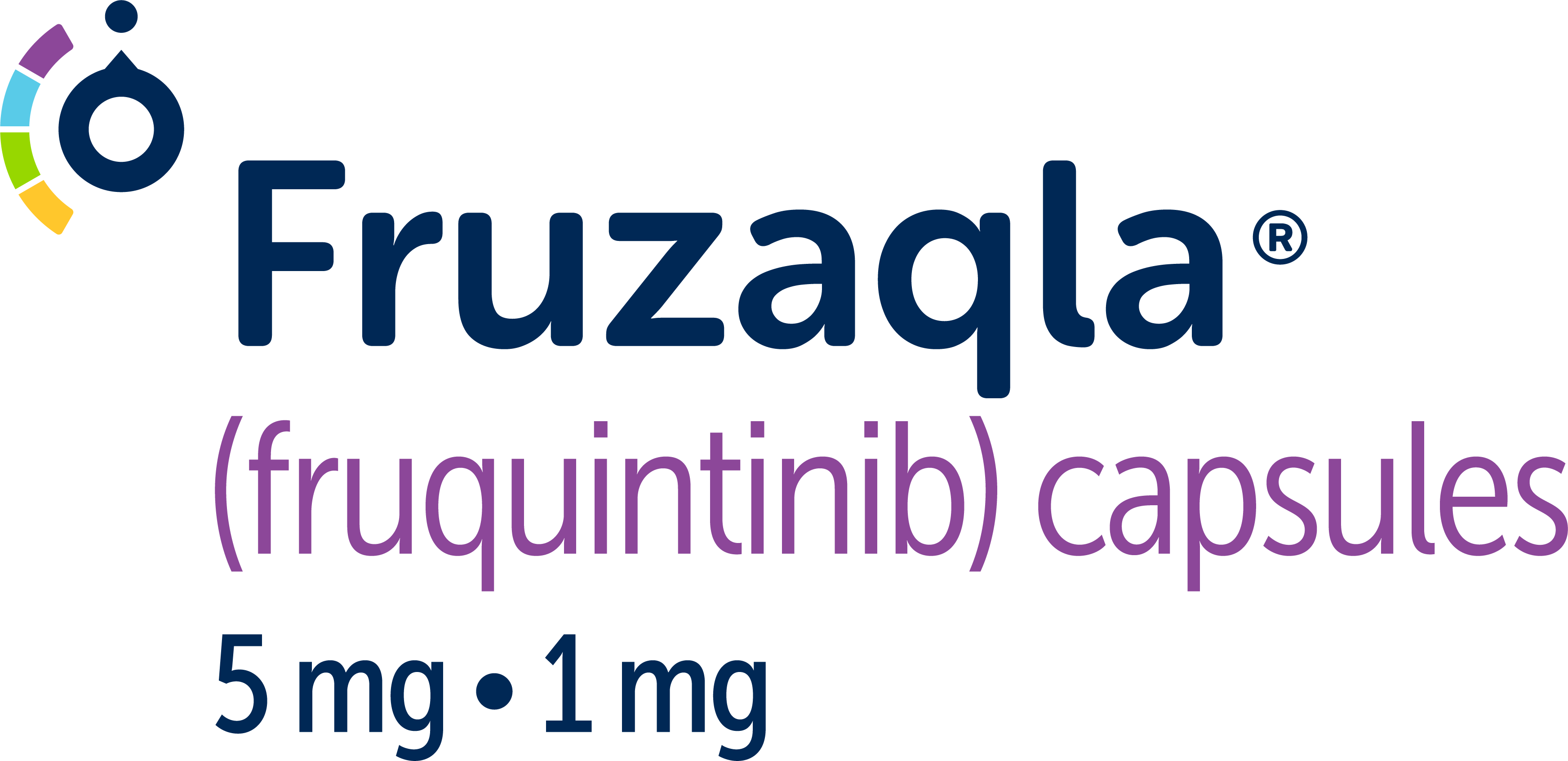IMPORTANT SAFETY INFORMATION, INDICATION, AND USAGE
Expand+FRUZAQLA may cause serious side effects, including:
- High blood pressure (hypertension). High blood pressure is common with FRUZAQLA and can also be severe. Your healthcare provider will check your blood pressure before starting treatment with FRUZAQLA, 1 time every week for the first month of treatment, and then at least 1 time a month or more often if needed during treatment. Your healthcare provider may prescribe medicine to treat your high blood pressure if needed. Tell your healthcare provider if you get any of the following symptoms of hypertension during treatment: severe headache, lightheadedness or dizziness, confusion, changes in vision, chest pain, trouble breathing, nosebleeds, or vomiting.
- Severe bleeding (hemorrhage). FRUZAQLA can cause bleeding that can be serious and may lead to death. Tell your healthcare provider if you get any of the following symptoms of bleeding during treatment:
- unusual, severe, or bleeding that will not stop
- bruising
- lightheadedness
- vomiting blood or your vomit looks like coffee grinds
- blood in the stool or black stool that looks like tar
- blood in the urine or urine that looks red, pink, or brown
- coughing up blood or blood clots
- menstrual bleeding that is heavier than normal
- unusual vaginal bleeding
- nose bleeds that happen often
- Infections. FRUZAQLA can increase the risk of infections, including serious infections that can lead to death. The most common infections with FRUZAQLA happened in the urinary tract, nose or throat, and lungs. Tell your healthcare provider if you get any of the following symptoms of infection during treatment: fever, severe cough with or without an increase in mucus (sputum) production, severe sore throat, trouble breathing, burning or pain when you urinate, or redness, swelling, or pain in any part of the body.
- A tear in your stomach or intestinal wall (gastrointestinal perforation). FRUZAQLA can cause gastrointestinal perforation that can be serious and may lead to death. Tell your healthcare provider right away if you get any of the following symptoms of gastrointestinal perforation during treatment: severe stomach (abdominal) pain or stomach pain that does not go away, vomiting or vomiting blood, blood in the stool or black stool that looks like tar, fever or chills, or nausea.
- Liver problems. Increased liver enzymes in your blood are common with FRUZAQLA and can also be severe and may lead to death. Your healthcare provider will do blood tests before and during treatment with FRUZAQLA to check for liver problems. Tell your healthcare provider if you get any of the following symptoms of liver problems during treatment: yellowing of your skin or the white part of your eyes, dark-colored (tea-colored) urine, pain in your right upper stomach area (abdomen), loss of appetite, nausea or vomiting, or bleeding or bruising.
- Protein in your urine (proteinuria). Protein in your urine is common with FRUZAQLA and can also be severe. Your healthcare provider will check your urine for protein before starting and during treatment with FRUZAQLA. Tell your healthcare provider if you have to urinate more than usual or if you get swelling of your face, hands, arms, legs, or feet during treatment.
- Hand-foot skin reactions (Palmar-Plantar Erythrodysesthesia [PPE]). Hand-foot skin reactions are common with FRUZAQLA and can also be severe. Tell your healthcare provider if you get a severe rash or redness, pain, blisters, bleeding, or swelling on the palms of your hands or soles of your feet during treatment.
- Posterior Reversible Encephalopathy Syndrome (PRES). PRES is a serious condition that can happen in your brain during treatment with FRUZAQLA. Tell your healthcare provider right away if you get any of the following symptoms during treatment: headache, seizures, confusion, changes in vision, or problems thinking.
- Wound healing problems. Wounds may not heal properly during treatment with FRUZAQLA. Tell your healthcare provider if you plan to have any surgery before starting FRUZAQLA or during treatment. You should stop taking FRUZAQLA at least 2 weeks before planned surgery. Your healthcare provider will tell you when you may start taking FRUZAQLA again after surgery.
- Blood clots in your blood vessels (arteries). FRUZAQLA can cause blood clots or blockage in your blood vessels that may lead to heart attack, stroke, or death. Get medical help right away if you get any of the following symptoms during treatment:
- severe chest pain or pressure
- pain in your arms, legs, back, neck or jaw
- shortness of breath
- numbness or weakness of your face, arm, or leg, especially on one side of your body
- feeling lightheaded or faint
- sweating more than usual
- sudden confusion, trouble talking or understanding things
- trouble walking
- sudden severe headache
- sudden vision changes in one or both eyes
- dizziness or loss of balance or coordination
- Allergic reactions to FD&C Yellow No. 5 and FD&C Yellow No. 6. FRUZAQLA 1mg capsules contain the inactive ingredients FD&C Yellow No. 5 (tartrazine) and FD&C Yellow No. 6 (sunset yellow FCF). FD&C Yellow No. 5 (tartrazine) can cause allergic-type reactions (including bronchial asthma) in certain people, especially people who also have an allergy to aspirin. FD&C Yellow No. 6 (sunset yellow FCF) can also cause allergic reactions. Tell your healthcare provider if you get hives, rash, or trouble breathing during treatment with FRUZAQLA.
The most common side effects of FRUZAQLA include:
- voice changes or hoarseness
- stomach-area (abdominal) pain
- diarrhea
- weakness, lack of strength and energy, and feeling very tired or sleepy (asthenia)
FRUZAQLA may cause fertility problems in females, which may affect your ability to have children. Talk to your healthcare provider if you have concerns about fertility.
These are not all of the possible side effects of FRUZAQLA. Call your doctor for medical advice about side effects. You may report side effects to Takeda at 1-844-662-8532 or FDA at 1-800-FDA-1088 or www.fda.gov/medwatch.
Before taking FRUZAQLA, tell your healthcare provider about all your medical conditions, including if you:
- Have high blood pressure.
- Have bleeding problems
- Have an infection
- Have liver or kidney problems
- Plan to have surgery or have had recent surgery. You should stop taking FRUZAQLA at least 2 weeks before your planned surgery. Your healthcare provider will tell you when you can start FRUZAQLA again after your surgery
- Have recently had a blood clot, stroke, or heart attack
- Are allergic to FD&C Yellow No. 5 (tartrazine) or FD&C Yellow No. 6 (sunset yellow FCF)
- Are pregnant or plan to become pregnant. FRUZAQLA can harm your unborn baby. You should not become pregnant during treatment with FRUZAQLA.
- Females who can become pregnant:
- Your healthcare provider will do a pregnancy test before you start treatment with FRUZAQLA.
- Use effective birth control (contraception) during treatment and for 2 weeks after your last dose of FRUZAQLA.
- Tell your healthcare provider right away if you become pregnant during treatment with FRUZAQLA.
- Males with female partners who can become pregnant:
- Use effective birth control during treatment and for 2 weeks after your last dose of FRUZAQLA.
- Tell your healthcare provider right away if your partner becomes pregnant during your treatment with FRUZAQLA.
- Are breastfeeding or plan to breastfeed. It is not known if FRUZAQLA passes into your breast milk. Do not breastfeed during treatment and for 2 weeks after your last dose of FRUZAQLA.
Tell your healthcare provider about all the medicines you take, including prescription and over-the-counter medicines, vitamins, and herbal supplements. FRUZAQLA may affect the way other medicines work, and other medicines may affect how FRUZAQLA works.
Especially tell your healthcare provider if you take blood thinners (anticoagulants).
Know the medicines you take. Keep a list of your medicines to show to your healthcare provider and pharmacist when you get a new medicine.
Please see Patient Information in the FRUZAQLA (fruquintinib) full Prescribing Information.
What is FRUZAQLA® (fruquintinib)?
FRUZAQLA is a prescription medicine used to treat adults with colon or rectal cancer that has spread to other parts of the body (metastatic colorectal cancer [mCRC]) and who have received previous treatment with certain anti-cancer medicines.
It is not known if FRUZAQLA is safe and effective in children.

